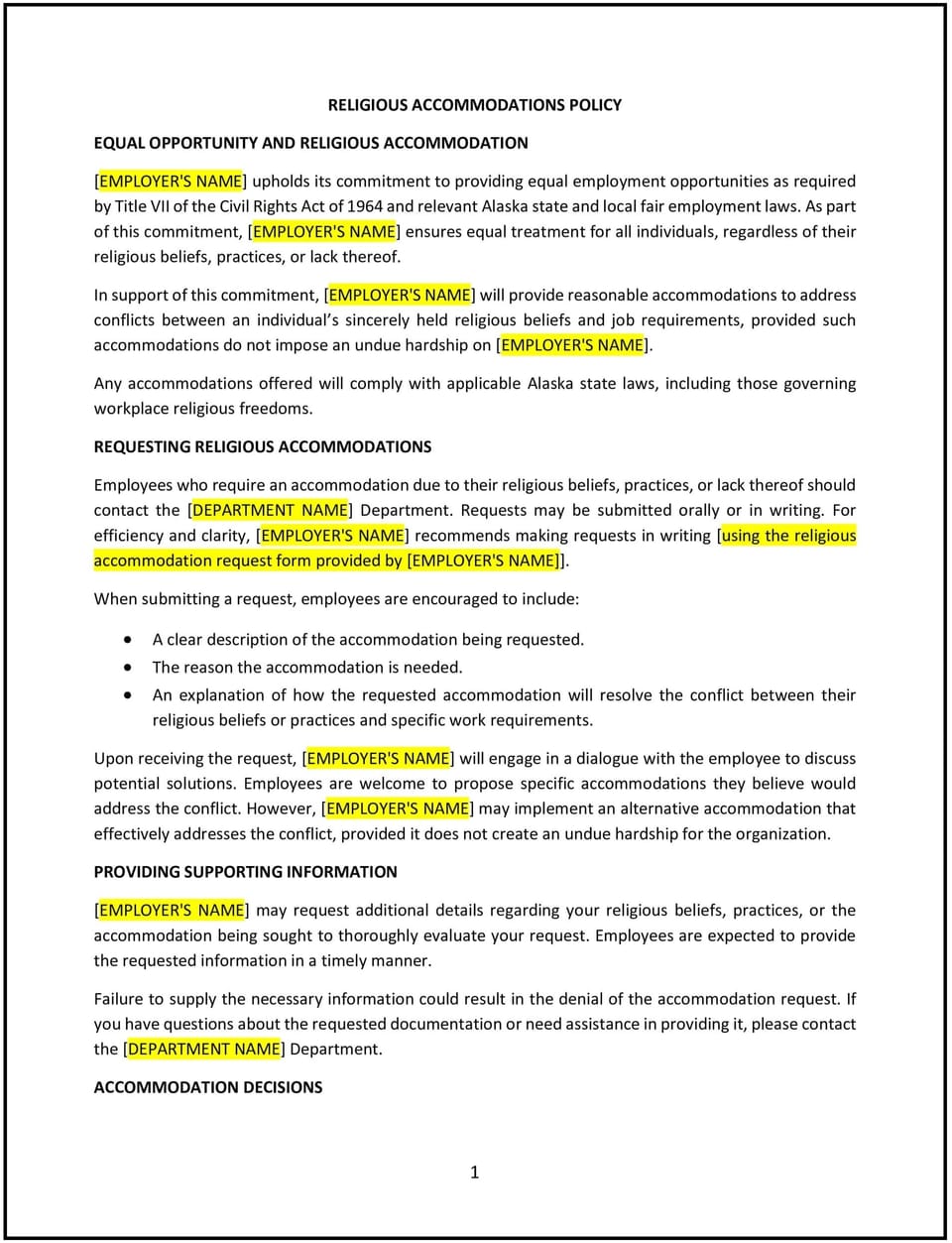Religious accommodations policy (Alaska): Free template

Religious accommodations policy (Alaska)
In Alaska, a religious accommodations policy provides guidelines for supporting employees' religious practices while maintaining operational efficiency. This policy outlines how the company addresses requests for accommodations, such as schedule adjustments, prayer breaks, or exemptions from certain job duties, in compliance with federal and state anti-discrimination laws.
By implementing this policy, businesses can foster an inclusive work environment while balancing the needs of the organization.
How to use this religious accommodations policy (Alaska)
- Define reasonable accommodations: Specify the types of accommodations that may be provided, such as flexible schedules, time off for religious observances, or adjustments to dress codes.
- Include a request process: Outline how employees can request accommodations, including submitting a formal request to HR or their manager.
- Address evaluation criteria: Clarify how the company will assess requests, considering factors like operational impact, cost, and feasibility.
- Emphasize anti-retaliation protections: Reassure employees that they will not face adverse consequences for requesting religious accommodations.
- Communicate clear expectations: Ensure employees understand their responsibilities in using accommodations appropriately and maintaining workplace harmony.
Benefits of using a religious accommodations policy (Alaska)
A religious accommodations policy provides several advantages for businesses in Alaska. Here’s how it helps:
- Promotes inclusivity: Demonstrates a commitment to respecting diverse religious beliefs and practices.
- Supports compliance: Helps businesses adhere to federal and state anti-discrimination laws, such as Title VII of the Civil Rights Act.
- Reduces conflicts: Provides a structured process for addressing accommodation requests, minimizing misunderstandings.
- Enhances employee morale: Shows employees that their beliefs are valued, fostering loyalty and engagement.
- Builds a positive culture: Strengthens workplace harmony by balancing individual needs with business requirements.
Tips for using a religious accommodations policy (Alaska)
- Tailor to local needs: Address specific considerations in Alaska, such as accommodating religious observances in remote or seasonal workplaces.
- Train managers: Provide guidance on handling accommodation requests fairly and effectively, ensuring consistency across the organization.
- Monitor compliance: Regularly review accommodation practices to ensure alignment with the policy and legal requirements.
- Foster open communication: Encourage employees to discuss their needs with HR or managers to identify mutually agreeable solutions.
- Update regularly: Revise the policy to reflect changes in laws, workforce diversity, or business operations.
Q: How should I evaluate religious accommodation requests?
A: Assess requests based on factors like operational impact, cost, and feasibility, while ensuring compliance with anti-discrimination laws.
Q: What types of accommodations might be included in this policy?
A: Accommodations may include schedule adjustments, prayer breaks, dress code exceptions, or time off for religious observances.
Q: How can I ensure fairness in handling accommodation requests?
A: Use a consistent evaluation process, document all requests and decisions, and train managers to handle requests respectfully and equitably.
Q: Can an accommodation request be denied?
A: Yes, if the request creates an undue hardship for the business, such as significant operational disruption or excessive costs, it may be denied.
Q: How often should this policy be reviewed?
A: Review the policy annually or whenever significant changes occur in laws, workforce diversity, or company operations.
This article contains general legal information and does not contain legal advice. Cobrief is not a law firm or a substitute for an attorney or law firm. The law is complex and changes often. For legal advice, please ask a lawyer.


